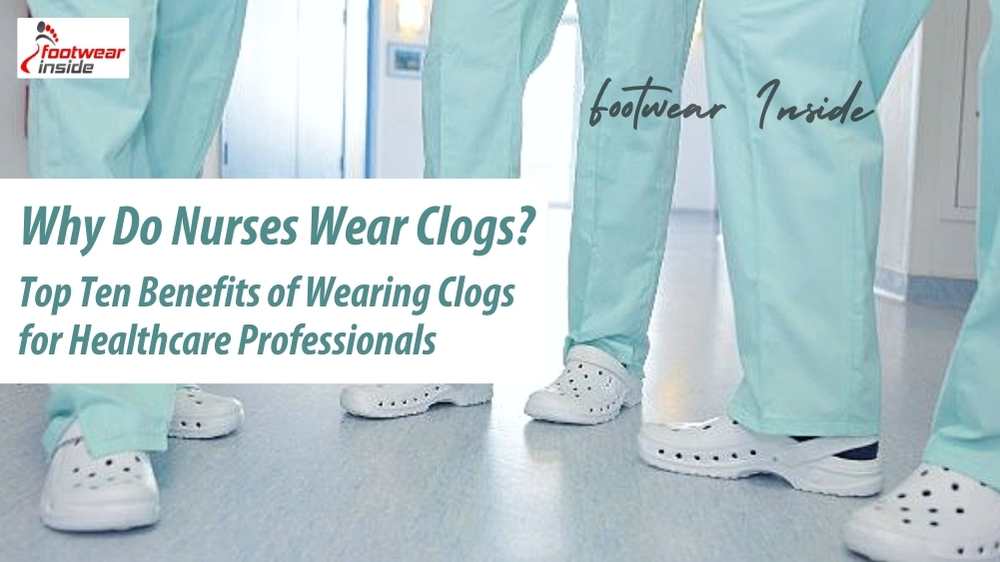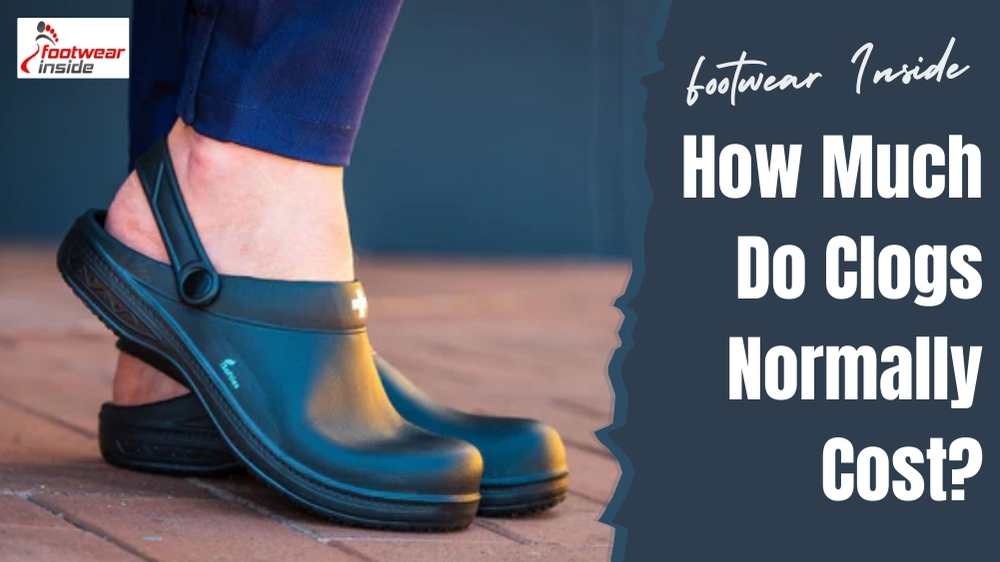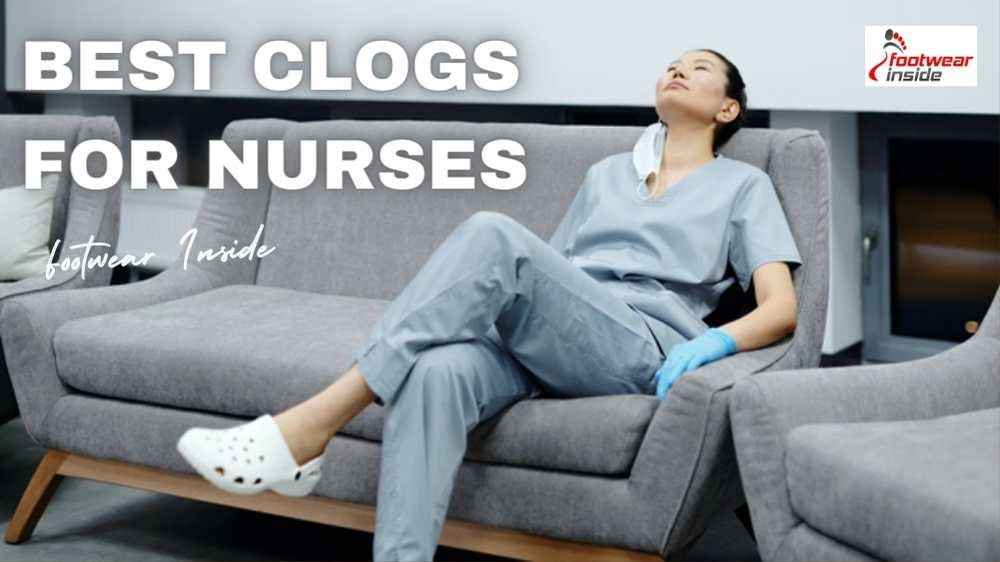Why do nurses wear clogs? Because they are super supportive for a 12-hours shift totally on their feet. Besides, clogs are comfortable, easily wearable, and effortless to clean.
Nursing is a profession that requires a lot of dedication, both mentally and physically.
That being said, nurses usually spend unlimited hours on their feet taking care of the patients. So, they prefer footwear that offers enough arch support with superior grip.
That’s where you cannot imagine any other shoes other than clogs, thanks to their ergonomic low-heel designs that minimize foot pressure while prolonged standing or walking. And they last forever even after everyday use.
However, let’s discuss how clogs became the best shoes for nurses over the years along with some popular clogs recommendations below.
Why Do Nurses Wear Clogs? Top Ten Benefits of Wearing Clogs for Healthcare Professionals
As stated above, clogs combine comfort, support, and safety simultaneously. Therefore, medical practitioners love this footwear as a reliable work shoe. Aside from their superior grip and protection, clogs come with the following advantages as an ideal pair of nurse white shoes-

1. Comfort
First thing first, clogs are comfortable. Not only for a few hours but for an entire 12-hour shift. That’s where it differs from sneakers or trainers and steals the cake.
They have a slip-on design which is even more comfy for day-long wear. The no-lace upper is indeed a thoughtful craftsmanship that puts no pressure on your feet.
No wonder doctors and nurses love this footwear throughout the day.
Best of all, the open-toe architecture makes the shoes breathable. Without having a closed back, they don’t make your feet hot and sweaty.
That’s why you don’t feel uncomfortable.
Compared to regular shoes which feel comfy and cushioned at the beginning but provide discomfort after a while, these are designed differently.
Resultantly, your feet feel relieved even after walking in clogs for hours.
2. Arch Support
We all know how hectic a shift could be for a nurse. They keep running, walking, and standing throughout the day to take care of the patients.
Naturally, they need footwear with extreme arch support. Thankfully, clogs offer that superior arch aid to reduce foot, ankle, and back pain.
If you buy a high-quality pair, they are even sturdier than athletic shoes. Naturally, you will feel more confident wearing clogs as they keep your feet from twisting awkwardly.
Needless to say, clogs minimize the extra stress on the foot and thus defend against additional strains on the back.
Therefore, you could battle that killing ankle, knee, or lower back pain by improving your posture while walking.
Aside from that, they feature super supportive midsoles with a foot-hugging fit. And thanks to an adequately cushioned inner sole, clogs are impact-resistant as well.
Some nurses highly appreciate this extremely reliable footwear as they mold to your foot feature over time.
That’s how they keep your feet properly aligned when you move.
3. Durability
One of the major benefits of picking clogs for nurses is that they are surprisingly durable. Clogs can last for years with little to no maintenance.
Being made with heavy-duty materials, these shoes are long-lasting, slip-resistant, and immune to wear and tear.
No matter how rough you use them, they are meant to withstand high pressure.
As clogs are engineered with high-grade rubber, they remain in the same shape even after years of regular wear.
Nevertheless, wooden clogs are also very popular among people who need firmer footwear for long working hours
Unlike regular trainers or athletic shoes, they don’t lose their integrity after a few months.
Rather, you can overuse them as long as you want maintaining the same aesthetics.
4. Easy to Wear
Clogs are easier to wear compared to laced shoes. They have no laces on the upper to tie.
As a result, you can put them on in a blink. Thanks to the slip-on feature with an open-toe architecture.
People providing medical support are always in a rush. They don’t have the luxury to tie shoelaces when an emergency happens.
Plus, nurses need to carry sharp medical accessories while assisting in surgery. If the shoes somehow remain untied, it could lead to a major accident.
That’s why doctors and nurses love clogs because they can just slip them on in a second.
If we consider the well-being of nurses, clogs are good choices compared to regular footwear with shoelaces.
You can put them on and take them off without touching them with your hands.
That’s surely a big plus as nurses handle severe patients at hospitals. Touching shoes with hands could lead to the spreading of several germs and infections.
5. Easy to Clean
No matter how hard you try, your shoes are going to be affected by blood or other body fluids when you work at a hospital.
On that note, you need footwear that is easier to clean. After a hectic 12-hour schedule, it’s very challenging to wash shoes thoroughly.
Saying that clogs are popular choices for nurse shoes as they are easily cleaned.
Just take a soft damp cloth and wipe the smooth upper of a pair of clogs. Then let the shoe air dry before your next wear.
Hey, don’t stress! It won’t take the whole day to dry.
Unlike fabric footwear, clogs don’t stain even any medical liquid spills on your feet.
Only a piece of wet cloth resolves the issue. What a relief!
6. Slip-Resistant Design
Are clogs good for your feet?
Yes, they are very good choices to make your feet relaxed and comfortable. Above all, the slip-resistant feature seals the deal for day-long use.
Generally, nurses are on the run in a hospital from ward to ward, patient to patient.
And as a clinic or hospital surface is frequently cleaned, it leads to frequent workplace accidents when nurses walk over the wet floor.
But slip-resistant clogs have textured soles to prevent such mishaps. With a superior grip and super snug fit, they offer additional foot support against recently cleaned surfaces.
Thus these shoes ensure maximum contact with the ground without any unintended foot movement. By defending against falls and friction, clogs are indeed one of the best choices for all healthcare professionals to keep them protected.
7. Non-Marking Sole
Aside from protecting your feet from falls and slippages, clogs also protect floors at your workplace. Wondering how?
With the non-marking soles, of course. Clogs have incredibly soft soles compared to trainers or sneakers.
Resultantly, they leave no marks on tiles or other surfaces in a clinic or hospital.
That’s how it makes floor cleaning way easier than other firmer shoes.
It’s certainly one of the major advantages of wearing clogs as nursing shoes.
Probably, that’s the reason some hospitals strictly suggest wearing clogs for doctors and nurses.
8. Versatility
Although clogs are far away from fashion footwear, they are versatile, indeed. Coming in a wide range of colors, styles, and patterns, clogs personify versatility at its best.
You can pick a pair that goes well with your personality. Nobody says you should look boring with shoes being a medical professional.
Instead, you should choose shoes that express your own taste.
On that note, clogs offer a huge variety of styles such as slip-on, lace-up, or t-strapped shoes to complement your feet.
9. Lightweight Structure
Why do nurses wear clogs at the workplace? Because they are extremely lightweight in structure so as not to put any burden on the feet.
In terms of heavier shoes, you need some energy to lift your feet when you walk.
But in terms of clogs, you feel relaxed. The incredibly lightweight architecture doesn’t put any pressure or stress on the feet no matter how fast you move.
Nursing is a job that makes you stand on your feet all day long. You certainly don’t want a pair of heavy boots that makes your feet sweat during hot summer days.
Instead, the light and breathable clogs are way better with optimum comfort and cushioning.
Even after a day-long tiring session at hospitals, you will feel like wearing nothing additional on your feet. Yes, clogs are that much lightweight!
10. Safety and Stability
Another significant reason nurses wear clogs is the unparalleled safety and stability of this footwear.
Having a low heel height, they make you move rapidly.
On the other hand, the slip-resistant sole is extremely reliable to keep your feet safe.
When nurses have to walk on wet surfaces, clogs offer non-skid movement.
Besides, the wider heel area ensures extra stability on slick surfaces.
Talking about safety, hospitals/clinics are all about drops and spillages of bodily fluids or harmful chemicals.
By keeping the entire feet covered, clogs save them from dangerous exposure to those liquids.
Furthermore, some of the dedicated nursing clogs feature crucial stability tools such as shanks to stop any accidental footwear movement.
Additionally, you can check this video out to understand why nurses wear clogs.
What Are the Different Types of Clogs?
As previously mentioned, clogs offer a wide array of styles and patterns.
Some of the prominent patterns of this footwear are closed-back clogs, open-back clogs, platform clogs, professional clogs, fashion clogs, t-strap clogs, etc.

However, based on the manufacturing materials, they are mainly of two types, traditional and modern.
The traditional clogs were made of wood. Having a thick wooden sole, such old-school clogs are popular for their timeless design.
Nevertheless, the wooden sole makes them inflexible. Plus, they lack sufficient shock absorption.
That’s when the modern clog variants appeared with an anti-static rubber sole with optimum flexibility.
Though both traditional and modern clogs have the signature thick sole and slip-on features in common, modern ones offer maximum foot support with breathability.
How Much Do Clogs Normally Cost?
Do you know the saying- you get what you pay for? That’s absolutely true for clogs.

Although these super durable shoes are known as high-end ones, they justify the premium price tag in exchange for incredible comfort and additional arch support.
Moreover, you don’t need to replace a pair just after a few months of wearing. So, a high-quality clog is a wise investment, indeed!
Generally, high-end clogs cost a handsome amount, around $150 or even more. But you will get a basic pair at $30-$100 depending on the brand, material, and type.
How to Find the Best Pair of Clogs for Nurses
Keep the following features in mind when you are looking for clogs for any healthcare professional-
Comfort
In any footwear, comfort comes first and so is the case here. Nurses get little to no rest and stand on their feet for 8-12 hours. Therefore, their shoes must provide comfort.
Heel Height
Go for clogs that have around 1-2″ of heels. Anything more than this height will cause strain and discomfort on your feet while standing for the whole day.
Material
Among rubber, leather, and synthetic materials, rubber clogs are best suited for nurses as they are affordable, easy to clean, and work great on slippery surfaces.
Breathability
Look for breathability in nursing shoes be it clogs or anything else. Otherwise, your shoes will trap moisture leading your feet to sweat badly.
Fit
It’s very important to choose the right size of clogs to ensure a stable and secure work experience. They should mold to your foot features. Go for a snug fitting that’s neither too tight nor too loose. And the heel must not slip out of your feet while walking in a hurry.
Best Clogs for Nurses
If you are looking for the best clogs for nurses, here are some recommendations based on the review of real-life nurses.

Dansko Women’s Clogs
We all know how famous Dansko shoes are. Truth be told, Dansko clogs are equally popular for their features and functionalities.
The Dansko XP 2.0 Slip-Resistant Women Clogs are no exception.
Providing unparalleled support, comfort, and cushioning, they are suitable for nurses, surgeons, veterinarians, and other healthcare professionals.
The patent leather sole along with a roomy toe box ensures all-day comfort, especially for women.
With a classic clog shape, it features a removable footbed to comfort custom orthotics.
And thanks to the slip-resistant rubber outsole, you can walk without worry on both dry and wet surfaces.
Best of all, these clogs are available in more than forty fun colors to satisfy your preference.
Sanita Pro Patent Professional Clogs
Secondly, meet a pair of Sanita clogs to take care of your foot health. These slip-on shoes are a little bit pricey but worth every penny.
They are basically professional shoes for women to fight the dreaded workplace experience.
With the 1.75″ heel and 1″ platform, these Pro Patent Professional Clogs will never let you down.
Being made of 100% PU leather, it comes with a microfiber insole. Therefore, your feet are adequately cushioned to battle back those extreme foot fatigue.
Aside from that, Sanita clogs are approved by doctors and work well for patients with special foot conditions.
Do you spend long hours on your feet? Go for these shiny leather clogs and enjoy your days at ease.
Skechers Work Clogs for Women
Looking for a budget-friendly pair of clogs for your long working days? You can check out these cute little clogs from Skechers, the name needs no introduction.
Being available in four different colors, they offer sufficient foot support with adequate shock absorption.
The 100% synthetic material makes them durable, comfortable, and supportive at a time.
Above all, the convertible heel strap in combination with a soft flannel lining offers a snug fit.
Allow some break-in period to these Skechers clogs and you are good to go.
Hey, wait! These shoes are both slip and oil resistant. Should you miss the deal?
Crocs Women’s Neria Pro Slip-Resistant Clogs
This one is a reliable, flexible, and above all, protective footwear from Crocs.
Being super easy to clean and maintain, they only require a gentle rinse after a tiring work session.
Aside from being suitable for nurses, they are popularly used in the kitchen, retailing, and food industry as well.
As these shoes come with removable and washable footbed liners, they are certified as comfy footwear for women at work.
If your feet want some freedom from those tight-fit sneakers, bless them with this pair of Crocs. They provide a relaxed and roomy fit with a low-height heel.
Crocs Neria Pro is lightweight, waterproof, and features a moisture-wicking liner to keep your feet dry.
FAQs
Are clogs comfortable for nurses?
Oh yes. Clogs are adequately cushioned with extreme shock absorption properties. Naturally, they are very comfortable, easy to clean, and even easier to wear. Moreover, clogs offer supreme foot support for nurses during long working hours.
Why are clogs good for standing all day?
Due to their super supportive construction. Thanks to the solid sole along with the sturdy architecture, clogs reduce additional pressure on the foot by reducing the body weight evenly. That’s why they keep the feet properly aligned and let you feel comfortable even after a day-long standing session.
Do you wear clogs without socks?
You need not. Clogs are comfortable enough and you can certainly wear them barefoot. But you can wear socks with clogs during winter.
What are the disadvantages of clogs?
Despite having countless advantages, clogs have some drawbacks as well. Firstly, they are not fashionable and fancy footwear. Secondly, traditional wooden clogs make awkward sounds against any surface.
And because of clog’s signature thick insoles, they offer limited flexibility compared to other shoes. Finally, it’s quite challenging to find the right clog size as they vary based on brand and style.
Why are clogs so expensive?
High material quality, thoughtful craftsmanship, sturdy ergonomics, specialized safety features, etc. contribute to the premium price tag of clogs. But not all clogs are equally expensive. You can get some pairs at a really affordable price range.
Final Words
Clogs have definitely stood the test of time as dedicated nursing footwear. They are exceptionally supportive, slip-resistant, and easy to wear.
Besides, they are compatible with both wet and dry surfaces which is an absolute must for any medical professional. And all thanks to the sufficient foot coverage, they protect your feet from blood, chemicals, or body fluids.
Basically, they tick all the boxes required for nurses during their job.
Hopefully, you understood why nurses wear clogs and never go back to regular shoes after wearing them.
But please remember they are suitable only for long-standing sessions, not for running or fast walking for prolonged periods.




